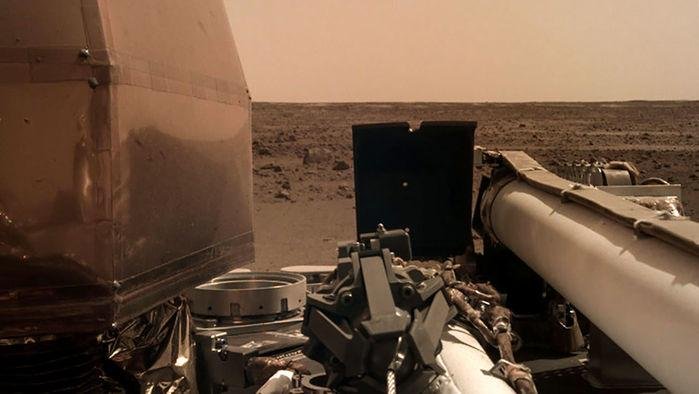Recent images sent by the Insight spacecraft.
A breakthrough in science happened almost invisibly in the world media. The spacecraft sent by the National Aeronautics and Space Administration (NASA) landed on Mars on Monday, November 25-27. The human habitat on the planet Mars went one step further. NASA's spacecraft took about 6 months to travel 3 million kilometers (about 22.5 times the distance from North America to Bangladesh). The spacecraft, made by NASA's 6-kilometer-in-one name, had a velocity of 5 kilometers per hour. The Mars atmosphere had a speed of 5 km per hour and its landing time was 5 km per hour.
This is NASA's successful mission to Mars after 212. Scientists began sending spacecraft to Mars in the 8th, and as such, the Insight spacecraft was the eighth successful operation in the spacecraft sent to Mars. But there were more than two dozen attempts. The spacecraft landed on the red-hot planet, only 5 percent of its success.
The Insight spacecraft project sent by NASA costs US $ 3 billion. Insight will send regular data and data to the world over the next 2 years. The 7 years of Mars is 6 days more than the 8 years of our planet. As such, Insight will be on the surface of Mars for more than a year. The purpose of this long-time Insight spacecraft is to better understand the seasonal changes in Mars.
Scientists are looking for the existence of life outside of our planet and on other planets. Similarity to the Earth This planet is the second smallest in terms of volume. Which is only zero decimal two four eight (9.25) percent of the earth's volume. Climate is also hostile but favorable for life; The seasonal variations are almost the same as on earth. The maximum temperature is 6 degrees Celsius but the minimum is minus 5 degrees Celsius.
Scientists believe that the Earth and Mars were created around the same time 1.5 billion years ago. At one time we had rivers and lakes like the earth; There are also signs of water flow. But Mars is now a very difficult and cool planet, as the climate changes.
At the same time, Mars is now a dead terrain, but scientists are keen to know how the world is so green today. And since he was so astronomical, so much interest and space for scientists from Mars.
The successful landing of the Insight spacecraft on Mars this year is a bit different than other missions. Because, this time, a 5-foot-deep hole will be drilled in the surface of Mars, and the temperature below the surface of Mars - which has never been done before. This year, the year-long Mars climate data will be available. By taking a panoramic imagery with modern technology, the image of the landing of the Insight spacecraft will be sent to Earth via two other NASA-based satellites, which are launched along with two Insight spacecraft and are observing the atmosphere of Mars.
The data sent by the Insight spacecraft will be analyzed by dozens of scientists working in NASA. And from that research, NASA will send a more powerful spacecraft to Mars, which will be able to substantiate the existence of the present, past, and far-reaching life on Mars.
Considering all of this, space scientists are enormous in landing NASA's Insight spacecraft. And he is also a rash of cheerful people. That's why thousands of people gathered in New York's Time Square to ignite the heavy rains to watch the TV cameras landing on Mars on the Insight spacecraft.
The scene celebrating the success of NASA scientists was also seen. In an immediate response, NASA wrote on its Twitter: "The image of Mars in the most beautiful! NASA looking forward to finding new home. "
Elon Musk, the founder of SpaceX, is already working on an expensive project to send people to Mars in 2021. Some of the world's wealthiest people have even confirmed a billion-dollar one-way ticket to Mars.
That day may not be too far away from the day when there will be regular flights from Earth to other planets like Mars. The success of NASA scientists today will be a milestone for those fortunate people of infinite time.

This is obviously a nonsense post, providing nonsense stats
For instance:
That would mean the distance USA to Bangladesh is over 133,333 km.
A simple calculation means it travelled 5kmph x 24 = 120 km per day.
As stated in the post, the distance os 3 million km. So, to travel that distance
we are looking at:
120 km per day, cover the 3m km, it would take: 250,000 days (which comes to: almost 685 years.)
Now THAT is truly NEWS! - We sent the spacecraft to Mars during the Middle Ages!!!
I have not attacked the poster on his use of the language, which is so bad that it makes total nonsense of the news, I have only challenged him on a few basic calculations / stats he offered.
I suggest that anyone interested in this subject look elsewhere for more dependable information.
Do you really think my information is wrong?
You cannot do the arithmetic for yourself?